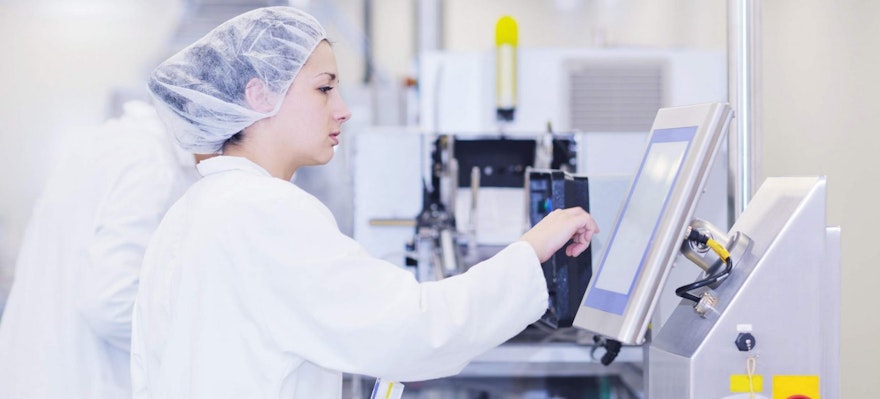To find the balance between productivity and quality, subject matter experts (SMEs) must be able to easily share their know-how with their teams. Learn how you can provide the right person with the right information when they need it.
When the right person has easy access to the right information, expertise sharing can help employees reach operational excellence. Pharmaceutical companies should capitalize on the know-how and best practices of their SMEs in order to stay at the top of their game in such a fast-moving and highly competitive environment. Constant and quick access to in-house expertise actually makes it possible to speed up implementation of new tools, processes, and operating procedures.
Enhance Knowledge and Expertise Transfer
The approach used to distribute GMPs (Good Manufacturing Practices) does not always facilitate practical implementation in production and QC laboratories. However, pharmaceutical companies must continuously train employees on best practices to ensure safety and guarantee that regulatory requirements for manufacturing, packaging, analysis, and storage processes are respected.
Though digital technology has become an integral part of our world, most companies continue to depend, for example, on paper documents to specify their operational procedures and ensure the best practices. It’s no secret that reading resource articles and partaking in PowerPoint training classes takes time for both student and trainer. Furthermore, these knowledge transfer methods aren’t always the most effective or engaging.
To respond to these challenges, companies can turn to step-by-step immersive video instructions filled with presentations, PDF documents, voice-overs, and notes… Pharmaceutical companies evolve in a highly controlled context and therefore have at their disposal an excellent means to promote and share knowledge and skills among peers.
Videos are more appealing and easier to use than written documents. The use of microlearning videos within a company allows it to enhance knowledge transfer. Work instructions through an immersive video contribute to the digitization of the best practices in manufacturing and quality control. They complement paper documents—or are a step towards going completely paperless!
Mitigate Errors and Incidents
In the pharmaceutical industry, instructions must always be clear and precise and can in no way be modified or incomplete. Operating procedures allow technicians to carry out tasks without the risk of error or omission. Adopting the best industry procedures and permanently optimizing processes prevents manufacturing incidents, delays, or issues from recurring while also contributing to reducing non-quality costs.
Microlearning videos make it easy to record the best practices and can be further enriched with diagrams, illustrations, photos, text, and markers. Laboratory technicians and operators can consult the interactive how-to video at any time and as often as they wish in order to fully comprehend a specific procedure.
The video format helps certain topics—oftentimes quite complex within the pharmaceutical industry—be more easily understood. It is reassuring for technicians to receive work instructions via an immersive video; showing rather than telling considerably improves precision and dramatically reduces the way in which something can be interpreted. video format helps certain topics—oftentimes quite complex within the pharmaceutical industry—be more easily understood. It is reassuring for technicians to receive work instructions via an immersive video; showing rather than telling considerably improves precision and dramatically reduces the way in which something can be interpreted.
Furthermore, the tutorial format makes it easy to organize and showcase information. SOPs (Standard Operating Procedures) must have a logical arrangement. Step-by-step immersive videos make it possible to divide a specific operating procedure up into multiple segments and can therefore focus on how every single action should be done in great detail. How-to videos can also evolve and be easily updated at any time. This is a great time saver for laboratory operators who no longer need to look up the latest operating procedure through paper documents.
Promote Employee Empowerment
To benefit from new technology and automation, every employee must proactively and continuously self-train in order to update their skill set. Expertise sharing empowers employees and allows them to independently upskill the handling of new tools and new procedures. Work instructions in video format can be accessed on demand and through any kind of media, directly in-house.
Ease the Decision Process
The P4 approach to medicine (Predictive, Preventative, Personalized, Participatory) largely relies on constant health data digitization, collection, and use through new technology. However, professionals within the pharmaceutical industry are constantly surrounded by new knowledge and material. This makes it difficult for them to find the exact information they need when they need it.
Microlearning videos can instantly respond to and remotely resolve these operational issues. Laboratory operators have direct in-house access to the information they need, which allows them to avoid manufacturing delays or standstills. Gathering the best practices for manufacturing and laboratory quality control will allow employees to access the required knowledge when they need it and help them in their decision-making process.
As it is better to predict rather than heal, QC analysts, in an effort to work towards continuous improvement, must be able to anticipate the smallest issue that could appear or become redundant. Managing inconsistencies and controlling risks therefore represent a major challenge for pharmaceutical companies. Implementing a knowledge management strategy will allow you to keep your competitive edge in an already highly competitive sector.
SMEs can therefore distribute their knowledge and expertise on a large scale and have it exponentially shared as a result of the network effect. Employees will consequently feel connected with each other and their SME peers.
Distributing a team’s best practices to other sites also places it in the global spotlight. Once SMEs see how their know-how is valued after being shared, they’ll feel further recognized and become more engaged. Sharing knowledge and expertise between employees also makes it possible to identify the most talented players.
Sharing the best practices through step-by-step immersive videos drives performance by improving on-the-job skills. It significantly improves processes and operational procedures. Each speach, which is in an immersive video format, facilitates continuous and independent employee upskilling to help reduce training costs. It also reduces non-quality costs by reducing non-conformities and therefore legal sanctions. Interactive how-to videos complement and complete manufacturing and quality documents. With this dynamic format, your SMEs’ knowledge and best practices are transferred efficiently and used to their fullest.k





